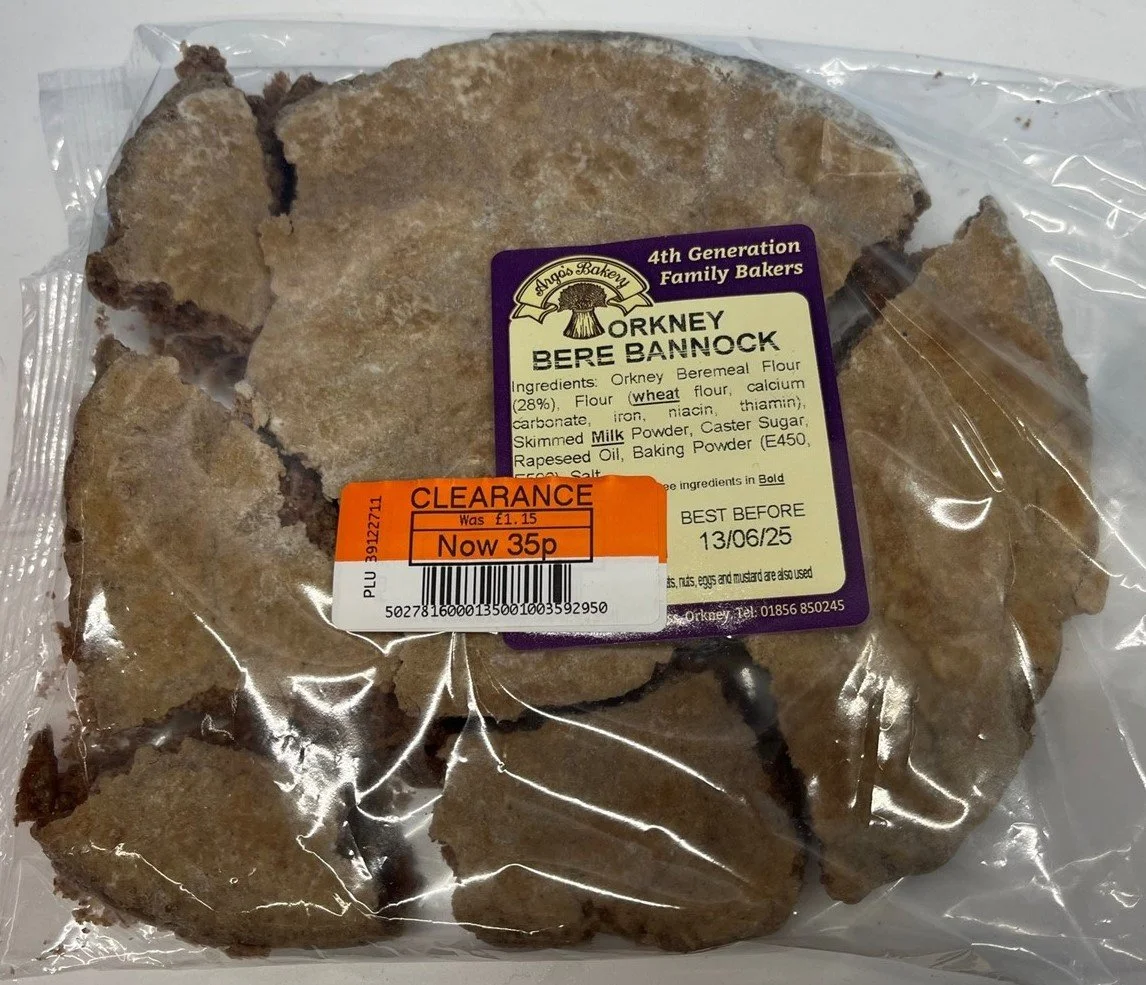Diary of a Shopkeeper, 29th June
‘I was thinking about you the other night,’ said Mrs Stentorian.
‘Really?’ I said, feeling nervous. ‘I can’t imagine why.’
‘One word,’ she said, ‘Foy.’
‘Foy?’
‘I attended the Foy in Stromness Town Hall. Part of the St Maxness Festival, you know.’
‘Ah, that Foy… A celebration of Robert Rendall.’
‘Exactly. What a marvellous man. I had no idea. He studied conks, he was a painter, and he wrote poems – which were performed admirably at the Foy. Of course, I couldn’t understand a word.’
‘Couldn’t you hear the readers? The town hall can be echoey.’
‘No! They were written in a dialect. They said it was called Norm.’
I spluttered, then covered it up with a cough. ‘I think you mean Norn, Mrs S. Though I’m pretty sure Robert Rendall’s language wasn’t…’
‘It was definitely Norm. I worked it out afterwards. Norm is short for Norman, you see: ‘the north man.’ That’s what the Scandinavians identified as in those days, hence the Norman Conquest: William the Conqueror was a Norman, he spoke Norm. And so did Robert Rendall.’
I wanted to argue with her, or at least stand up for Norn with two Ns, but the customer is always right. I thought I’d better divert her onto another course.
‘So, what can I help you with today, Henrietta? Some cheese? A bottle of wine? Some beurre normande, like William the Conqueror used to spread on his bannocks?’
She pointed her finger at me. ‘And THIS,’ she cried, ‘is why I thought about you at the Foy.’
‘You want some bannocks?’
‘No. I knew I could ask you this question, because you’re a shopkeeper. And so was Robert Rendall. He was a draper, did you know that?’
‘Yes, I did.’
‘No, not many people do. But I assure you, it’s true. He ran the Brig Larder, when it was the Brig Draper.’
‘I don’t think it was called that,’ I said.
‘So here’s what I want to ask you. Are there any other examples of writers who also run shops like that?’
‘Like the Brig Larder. Well, I hate to blow my own trumpet, but…’
She shook her head and harrumphed. ‘I told you already, it was a draper’s shop. Have there ever been any writers who ran draper’s shops? I though that you, as a shopkeeper, and a fount of useless knowledge, might know.’
I went to the sink, filled it up with hot water, and considered thrusting my face below the surface and leaving it there till Mrs Stentorian got the message and left me to get on with some work. But instead, I rinsed out a cloot and started wiping down the counters. A good dight calms the soul and cleanses the mind.
‘There’s one I can think of,’ I said. ‘HG Wells. His father was a draper, a highly unsuccessful one as I recall, and Herbert George worked in the shop as an assistant when he was a boy. Later on he wrote about it in a couple of books. I read one of them – The History of Mr Polly – quite funny actually.’
‘Are you sure?’ said Mrs Stentorian. ‘HG Wells was a science fiction writer, like our own HJ Giles. Wells wrote The World of the Wars and The Time Machine, about the man who invented clocks.’
I nodded. ‘He did write science fiction, but he wrote more realistic stories too. Not to mention lots of books arguing for atheism and socialism.’
She went pale. ‘Really? I had no idea. He’s lucky he’s not around now: that’s the kind of thing that would get classed as terrorism these days.’
‘There was at least one writer who was a grocer as well as a novelist,’ I said. ‘Bernard Malamud, an American writer of the mid-twentieth century.’
‘Has there been a Foy featuring him?’ asked Mrs S.
‘His connections with Orkney were pretty slim,’ I said. ‘In fact non-existent. But he did write a book about working in a shop like this, The Assistant. The main character is Morris, a 60-year-old shopkeeper in Brooklyn, and he’s struggling to compete with the supermarkets, when his store gets robbed.’
‘Wouldn’t happen here,’ said Mrs S.
‘Then a young man turns up offering to help get the shop back on its feet. But he turns out to be one of the robbers.’
‘You couldn’t make it up.’
‘He seems like a good guy to start with, but starts pilfering money and then assaults the shopkeeper’s daughter. So he gets thrown out. Unfortunately, the shop fails faster without him, so the shopkeeper decides to burn it down for the insurance money. Luckily the young guy turns up just in time to put out the fire and save the shop and the shopkeeper. At which point a rival grocer’s down the street goes on fire and burns down, and Morris picks up all his business and the shop thrives.’
‘I do love a happy ending.’
‘Then it starts to snow, Morris goes out to shovel it away from the shop door, catches pneumonia and dies. The robber and the daughter he assaulted get married and live miserably ever after.’
‘And Robert Rendall wrote that? They didn’t mention it in the Foy. Shopkeeper, you really are a useless fount of information.’
I forgot about one of my favourite authors, Caradoc Evans, who worked in draper’s shops in South Wales and London as a young man, and later wrote a cruel and funny novel about his experiences called Nothing to Pay (1930.) A quirky and funny novel about working in a grocer’s (more or less) is Convenience Store Woman (2018) by Sayaka Murata.
This diary appeared in The Orcadian on 3rd July 2025. A new diary appears weekly. I post them in this blog a few days after each newspaper appearance, with added illustrations, and occasional small corrections or additions.

